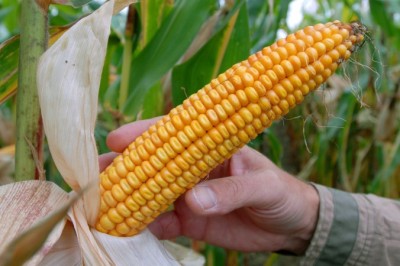Canada to Allow Unapproved GM Crop Contamination in Imports

A file photo of a genetically engineered corncob from a farm in Germany, Sept. 27, 2007. A new policy soon to be finalized will allow very low levels of genetically modified crops into Canada without a risk assessment by Health Canada. (AP Photo/Sven Kaestner)
After three years of discussions, Canada is close to finalizing its new policy on genetically modified (GM) foods that would allow very low levels of contaminated crops into the country—without a risk assessment by Health Canada.
Under existing rules, Canada has a zero tolerance for GM foods that are unapproved by Health Canada. The exception was created to facilitate trade, the Department of Agriculture said in an email statement to the Epoch Times.
“The government has been taking action to seek global solutions to prevent unnecessary trade disruptions, ensure open and predictable trade that is based on science, and make the agriculture sector more competitive,” the statement said.
“With the increased commercialization of GM crops around the world, low-level presence incidents are expected to become more frequent. That is why Canada has exercised leadership advocating for ways to manage low-level presence in a pragmatic and transparent way.”
The term “low-level presence” means any unintended low levels of GM crops that are authorized for commercial use or sale in one country, but not yet authorized in Canada. The level has been set at 0.2 percent for imports below which a risk assessment will not be required.
The new policy has been condemned by the Canadian Biotechnology Action Network (CBAN), long an opponent of GMOs and one of the groups involved in the consultations. The group says that in the interests of safety, there should be a risk assessment by Health Canada.
“For two decades, the industry and the Canadian government have asked consumers to trust federal regulations of GM foods, and now all of a sudden we’re asked to accept an absence of that safety assessment,” said CBAN coordinator Lucy Sharratt.
“This whole proposal puts into question the value of Health Canada’s safety assessment of GM foods. Either we have regulatory agencies to assess safety because it is necessary, or we can do away with that safety assessment with no scientific rationale, but due to trade concerns.”
Andreas Boecker, a University of Guelph professor who specializes in consumer perceptions of food, explains that the policy will mainly impact animal feed, and is needed to address a major trade concern.
“When you look at how much food and feed that are transported around the world, sometimes it cannot be avoided that there are low-level [GM] products in the shipment,” he said.
“Analytical detection methods have become very sensitive—you can detect traces of GM varieties—and the big concern is if you have a very strict policy it might make international trade very expensive.”
However, he adds, “From a legal perspective, if a variety is not authorized it shouldn’t be imported no matter how low the quantities may be.”
According to CBAN, the policy would remove Canada’s zero-tolerance for some unapproved GM foods that contaminate imports.
The group argues that a better move would have been to step up efforts to segregate GM and non-GM crops, and also conduct an assessment of potential export market harm before GM crops are approved in Canada.
“We need more regulation of GM foods, not less,” said Sharratt.
The Department of Agriculture said the new policy will be reviewed two years after its initial implementation, and every five years thereafter, or earlier if needed.
Kaven Baker-Voakes is a freelance reporter based in Ottawa.

